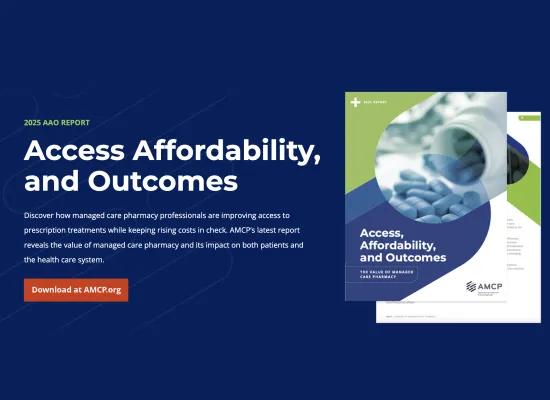
AMCP Foundation's 8th Annual Research Symposium Discusses Health Care Trends, Disruptors and Opportunities
Orlando, Fla., Oct. 24, 2018 —Misaligned incentives that drive overutilization of certain treatments, a realization that everyone can't have everything on demand, and the need to address social determinants to improve patient health were among the health care trends revealed at the Academy of Managed Care Pharmacy (AMCP) Foundation's 8th Annual Research Symposium.
The Symposium, held Oct. 22 in Orlando, Florida, was a preconference event to the AMCP Nexus 2018 national meeting that drew roughly 2,500 attendees. The Symposium engaged national health care thought leaders on new findings from the Foundation's ongoing research into trends, challenges and opportunities facing stakeholders across the health care landscape.
"Our Symposium each year brings together some of the top experts from across the country to share research and best practices that will help improve the delivery of care," says Paula J. Eichenbrenner, MBA, CAE, Executive Director of the AMCP Foundation. "We are proud of this role in supporting the managed care pharmacy profession, which touches the lives of nearly 300 million Americans who are covered under a managed pharmacy benefit."
The participants addressed health care affordability, drug pricing and spending; innovative and curative therapies; health plan coverage; big data and health IT; industry consolidation; and health care public policy. Central to the research findings was the concept of affordability, which included discussion around accessibility, value, quality, cost and outcomes.
According to the research survey of health care stakeholders, drug pricing was identified as having the most impact on the future of health care, with 93 percent of respondents classifying it as "very or extremely impactful," followed closely by innovative and curative therapies (88 percent) and industry consolidation (80 percent).
Overwhelmingly, respondents also considered the lack of transparency in drug pricing be the top barrier to care, and believed that evidence-based medicine (97 percent of respondents) and value-based contracting were viable solutions to address the issue moving forward. The research, presented by Xcenda's Matt Sarnes, PharmD, Brenda Popelar, PharmD, MS, also uncovered trends, barriers and solutions to address population health management, industry consolidation and optimal health coverage.
The Symposium keynote speaker was Dr. Reed V. Tuckson, Managing Director of Tuckson Health Connections. Dr. Tuckson has been appointed to leadership roles at the National Institutes of Health and the National Academy of Medicine, and has been recognized by Modern Healthcare Magazine as one of the "50 Most Powerful Physician Executives" in health care. The Symposium was moderated by Dr. Kevin Sneed, a professor and founding dean of the University of South Florida College of Pharmacy.
The program also included presentations focused on stakeholder perspectives on innovations in health care. Speakers revealed actionable insights and programs to address the changing health care landscape from the patient, physician, health plan and employer communities. The participants were:
- Physicians: Is Cancer Treatment a Stalking Horse for the Future of Health Care? Presenter: J. Leonard Lichtenfeld, MD, Deputy Chief Medical Officer, American Cancer Society
- Patients: The Future of Person-Centered Care: Creating Innovations in Delivery and Patient Care that Matter to Patients. Presenter: Alan Balch, PhD, President, National Patient Advocate Foundation
- Health Plans: Addressing the Social Factors of Health is Good Medicine. Presenter: Kathleen Stillo, MBA, VP Operations, Clinical Redesign Team, UnitedHealthcare
- Employers: Employers, Benefit Creativity, and Disruptive Factors. Presenter: F. Randy Vogenberg, PhD, Director, Institute for Integrated Healthcare
Presenters described the consequences of inaction by stakeholders, including policy makers, employers, patient and consumer groups, physician groups, hospital systems, health plans and pharmacy benefit managers.
For more information, visit www.amcpmeetings.org/extra-events/amcp-foundation-symposium/
ABOUT AMCP Foundation: Established in 1990, the AMCP Foundation is the philanthropic arm of the Academy of Managed Care Pharmacy (AMCP). It exists to advance collective knowledge and insights on major issues associated with the practice of pharmacy in managed health care settings. By facilitating innovative research initiatives and providing educational opportunities to learn about managed care pharmacy, the AMCP Foundation invests in the future of managed care. Visit www.amcpfoundation.org.
Featured News & Resources
See Full CalendarAward Applications Open
AMCP eLearning Day: Nexus Encore
Upcoming Events
AMCP offers a wide variety of educational opportunities, from events and webinars to online training.







